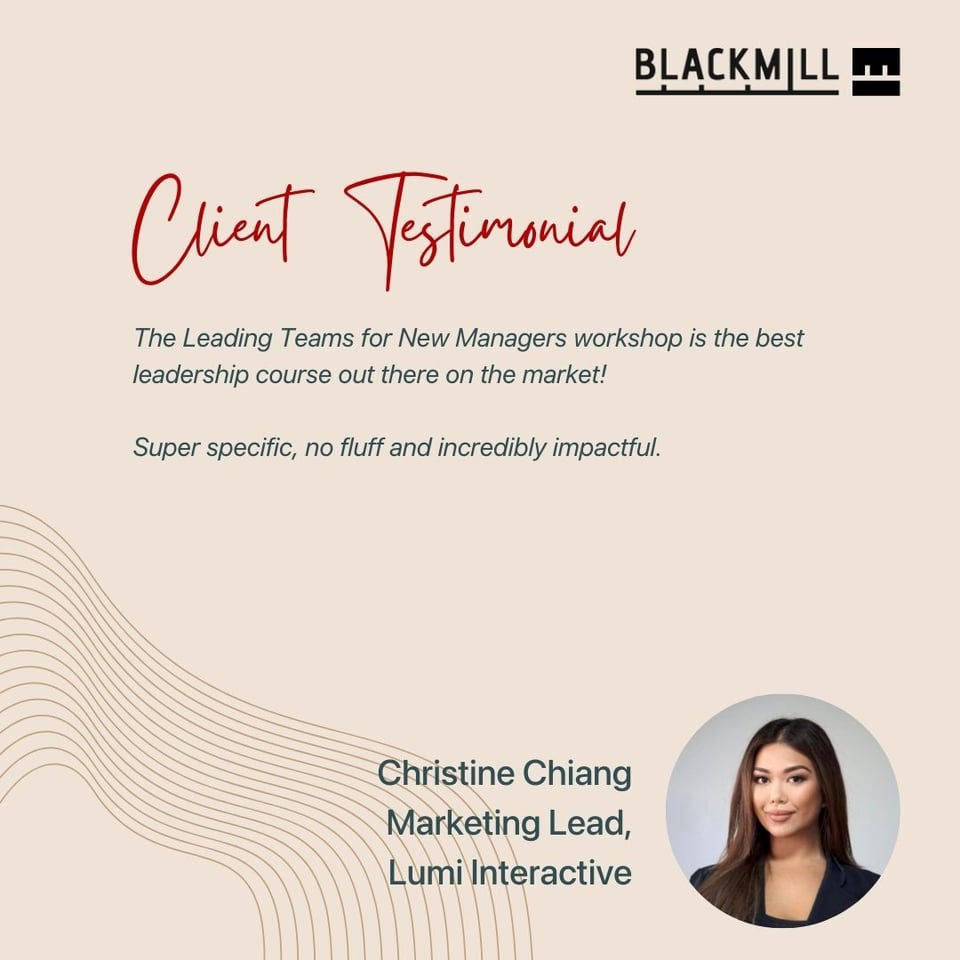Blackmill: not just leadership skills
You might think our mission is to teach leadership skills.
Yes, we coach executives and other senior leaders. And, yes, we offer multiple different workshops where leadership is the core theme. But those are not why we're here. They are the means, not the end.
Our purpose is to improve the day-to-day work environment of every software engineer we can reach, by improving the team's culture, communications, and work processes while helping both the organisation and its individuals to achieve their goals.
We know the human element of helping tech teams collaborate better. We help your teams provide value on a regular cadence. We help everyone to communicate better. We help you get shit done.
So why all the leadership stuff?
Because a lot of what is needed starts with leadership. And that's what technologists and technologist-led companies most often need help with. Technologists are awesome at solving technology problems. And that's usually better done in-house anyway.
Our industry has often poorly equipped technologists to address the kinds of problems that can't be solved with technology. We tell coders to code and designers to design. The focus is for individual contributors to contribute individually. Makes sense. Then we make them team leads and managers (which is a whole new skillset they need to learn) and wonder why they don't have any of the team-focused skills we need.
As companies grow, they run into more problems that can't be solved solely with technology. We know; we’ve been there.
Effective leadership is the cornerstone for smooth operations. We concentrate much of our work on leadership and communication as the means of getting to the end: shipping.
~ Lachlan
What’s been happening?
_SOUTHSTART
Elle and Lachlan travelled to Adelaide in early March to join what seemed to be half the Australian startup ecosystem at _SOUTHSTART. It was an excellent couple of days, with lots of new connections made and relationships with old friends refreshed.
Nicola's coaching certification
Nicola recently did the workshop for her IECL Level One Organisational Coaching certification. Just a few co-coaching circles for practice and some essay-writing between her and that certificate.
Like Elle and Lachlan, Nicola found the workshop gave her some great prompts and tools to use in her coaching work, but best of all confirmed her approach is valuable.
Leading Engineering Teams workshop
Is it time to talk about the May Leading Engineering Teams workshop already?! It is!
Tickets and details available here

New newsletter format
We're going to try something new! We want to deliver this newsletter on a more predictable cadence than some time in the month so we're going to break it down into two chunks and deliver one each fortnight. Same content sections as ever, but more consistent in terms of timing. That's the plan, anyway. Let us know how we do.
What are we reading?
- Stepping up: Becoming a high-potential CEO candidate — Look at us sharing a McKinsey article! This piece on checking your readiness and motivations for taking on a CEO role is broadly applicable (with a little license) for any step up into a new level of leadership. Lots of actionable concepts here.
- Ever been on a lousy leadership course? Good leadership training needs these 5 ingredients — The Conversation with an excellent approach to absorbing and then putting to use any leadership training you may happen to take with a trusted provider like, say, Blackmill.
- How to respond to 9 myths about our gender pay gap problem — The Gender Pay Gap in Australia has existed for a long time but made fresh news when the WGEA recently began tying company names to the data. It's sparked a lot of conversations. Here's some solid grounding for contributing to those conversations in a useful and factual way.
- Generative — Ethan Marcotte has put together a thought-provoking series of quotes to drive home some ideas around the thing currently hyped as Artificial Intelligence, whom it truly impacts, and how.
- The state of culture, 2024 — Ted Gioia offering 'a glimpse into post-entertainment society'. It's a theory, or a thought experiment, or a saddening statement of fact. It's from an American lens, but then, so is much of our global culture.
A cuppa with Lisa Deng

1. What do you do? And what do you like about your work?
I am the founder and CEO of SkillsRobin (www.skillsrobin.com). SkillsRobin is a platform to help employers hire developers and designers, by getting recommendations from other tech professions. The idea behind it is the best hires are usually through word of mouth, but not everyone has a great network. Our goal is to match people who would otherwise have never met.
I think the best thing about my work are my customers. Our early adopters are mainly early stage tech startups where the hiring manager is often also the founder. These are people with big dreams, but lack the experience or resources to run a traditional recruitment campaign. It’s rewarding to help them on their journey by matching them with someone who can 10x their team.
2. What aspect of your work do you find most challenging?
Before starting SkillsRobin, I was working as a product designer at a number of scale ups in the Australian tech ecosystem. The product development side of business comes easily to me however, sales and marketing is definitely something that I’ve had to learn (and am still learning) on the job. When you’re starting a business, you need to get comfortable with putting yourself out there and getting rejected or ghosted 95% of the time. But you need to go through all of the NOs, to get to the YESes.
I don’t think it’s something that anyone finds easy, but it’s definitely something you can get used to.
3. What are you passionate about?
I would like to see more women in tech because that’s where a lot of the best opportunities (and money) is. When there’s a lot of growth in a sector, sometimes you don’t need to work as hard, because you can rise with the tide. Large gender imbalances in lucrative industries can lead to large socioeconomic inequalities in society as well.
Currently with the candidates on SkillsRobin, we have a roughly 50/50 split between genders. Although software engineering is a heavily male dominated industry, we consciously seek referrals for upcoming female engineers from schools, meetup groups and other female tech professionals to help promote women in the industry.
4. What are recent accomplishments you are happy with?
Since launching SkillsRobin at the end of last year, we’ve successfully placed 4 people in roles, with several more currently being interviewed. On average, hiring managers only need to talk to 3 job seekers from SkillRobin before making a hire. These are great stats considering 98% of applications received through LinkedIn are not even qualified for the role. Our goal is to offer the services of an external recruiter at a 5th of the price, by leveraging the power of our referral network.
5. What is one mistake that you will never make again?
Staying in a job I didn’t like for too long, just because I wasn’t sure what to do next. Sometimes a slow decision is worse than a wrong decision. At least you learn from mistakes.
6. How do you manage stress?
Eliminating clutter - both physical, mental and work clutter. Avoid thinking too much about things beyond my control. Spend time with loved ones to take my mind off of things.
7. What is the best advice you can give?
Write down the 3 things you want to do most before you die/get old. Assess if what you are doing now is conducive to those things. If not, something might need to change.
8. What one thing would you change about our society?
Private cars being the number 1 mode of transportation. Environments affect the way people live and for too long, cities have been designed for cars not people.
9. What are your goals or aspirations for 2024?
Hit my business revenue and customer KPIs. Boring I know, haha.
What are we cooking?
Lisa: This is not my recipe but I like it a lot. It is a recipe for Australian banana bread.
The article talks about how simple the recipe is and how it is a favourite on the website, but doesn't explain why they consider it Aussie. What do you think?
And we’re out
Thank you for showing an interest in our newsletter and we hope that you enjoyed the read. Feel free to contact us if you have any feedback, a burning question, or just a recipe that you would like to share.
Until next time, keep learning!
Everyone at Blackmill